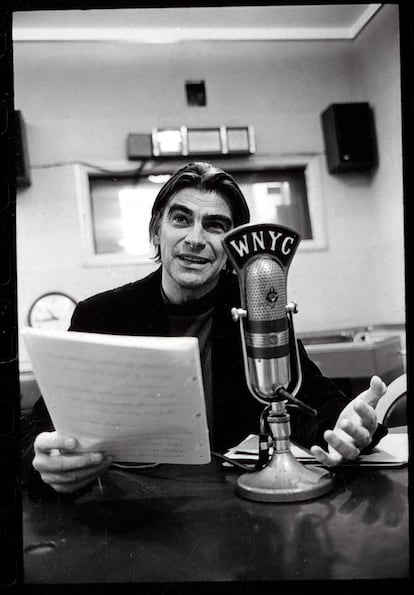It's a winter night in New York. In a booth in North Square, a small underground bar serving cocktails named after Jane Jacobs, the woman who saved Manhattan, AM Homes, the writer, talks about her teenage daughter and Stanley Elkin. She says of her daughter that she is worried because she does not really know what is going through her head. It's a mystery, he says. And a complicated one, because he has complicated friends. Of Stanley he says that he was also a complicated guy but that what he did I'm going to like because it was "a lot of fun." "He was from Brooklyn," he says. "Like Gilbert Sorrentino," he says too. I've hardly heard of either of them then.
I research them. I buy all the books from each of them that I can find. I discover that the first was born in 1929, and that the second was born a year later. I imagine their mothers passing them in strollers on the streets of Brooklyn. I fantasize that they have seen each other so many times in the supermarket that they have begun to recognize and greet each other. They do not know that what is bellowing in there, in each of their carts, will one day try to smash everything they touch by writing, in very different ways, but just as exuberant and incorrectly cursed. And then I imagine them coinciding in some library? No, because the Elkins moved to Chicago shortly.
And yet Elkin returned to New Jersey so often — he spent his summers in a Jewish vacation colony — that much of his stories are set in New York.
His sense of humor is wildly black, macabre.
A good example of this is the incorrectly delusional
Magic Kingdom.
(La Fuga), the last link in the chain of recovery of his work in Spain that began in 2015 with the also very black
El condominio
(also in La Fuga) and continued in 2018 with the uncomfortable stories of
Poetics for stalkers
(Contra) .
The protagonist of
Magic Kingdom
is a father who has just lost a son and takes seven sick children to Disney World.
Cover of Stanley Elkin's 'Magic Kingdom', published this year by La Fuga.
Children are dying of all kinds of rare diseases. There is one who is as old as the oldest of his great-great-grandparents would be. Bale, a lover of life - ”Only the insane believe that life is hard. Hard? If it is softer than silk pajamas ”-, he wants those children to enjoy what remains of them like maharajas, as his son could not - who, however, died being discreetly famous for his illness, and happy, believing that they were going to carve him into Madame Tussaud's — who perished amid countless absurd tests. Elkin shoots, from the apparent center of the most incorrect incorrectness, a hectic and invasive stylistic delight paradoxically full of life.
"A writer who is concerned with political correctness will, in all probability, be one incapable of writing satires, because satire, by nature, offends someone or something," said Gilbert Sorrentino in 1994, the undoubtedly judging for stories such as the majestic, playful and perfect
The Dignity of Work
, David Foster Wallace's clearer teacher - who ended up losing himself in a leafy without, at times, exit - and in turn, the American putative son of the great Flann O'Brien . Sorrentino, who died in 2006, left behind a score of formally expansive and succulently absurd titles, as well as the 20 recently rescued stories of
La luna en fuga
(Electric Sky).
Unlike Elkin, Sorrentino was where he should when he should, but he avoided being in any kind of photo. In other words, he waded through the beatniks - he was a friend of a very old William Carlos Williams, the poet without whom they would not have existed -, every poetic movement of the time - the Black Mountain, or the projectivists - and, of course, to the inevitably disjointed narrative postmodernism — the Gaddis, Barth, Coover, Vonnegut, Barthelme, Pynchon. He was placed, who knows if conscientiously, on the margins of the margins, something that Elkin himself did without wanting to. And for that alone the world has never said enough of either one or the other.
That is to say, today it is difficult to find an interview with either of the two in a publication of higher rank than the Brooklyn Rail - and it is not even an interview when you do it, it is an article written by a student of one of them, in this Yes, Sorrentino— but when it is done, what each of them says about their work is superbly lucid. Why? Because the only ones who got close to them knew what they were up against. That is why every little article, or little handful of questions, is almost a thesis about your work. That is, they may have been little read, but they must have felt well understood. "Spectacle should not be confused with writing," Sorrentino once said.
“The only thing a writer should worry about, if the writer is understood as an artist, is making art.
And he should be able to afford to do so, in the same way that the physicist does physics and the surgeon operates.
If you are worried about becoming some kind of anachronism, you should stop writing and dedicate yourself to something else, ”he also said.
He spoke that it should be taken for granted that this writer was not going to sell too much - he went on to say that he could not exceed 1,500 copies, which in the United States is almost an infinitesimal number - because sometimes, or almost always, that happened with the art.
There was no mention of the fact that the recipients were very likely to become writers.
Gilbert Sorrentino, in New York, in the 1960s.
Writers who could, taking this from here and that from there, become writers that everyone read and respected everywhere. Like two of his
real
students
—for yes, Sorrentino taught at Stanford, and some other universities, and was, recalls a certain Eugene Lim, a “passionate” teacher who mostly talked about other writers—, Jeffrey Eugenides and Jenny Offill . In different decades, both have put the (publishing) world at their feet, and although in different ways, the influence of Sorrentino's formal deconstruction is evident and necessary. It seems that it has molded them, allowing them to choose a different mold in each case.
The same thing happened with Hubert Selby Jr. By the time Selby Jr. was beginning to write, Sorrentino was editing a magazine,
Neon
. Since they had been friends since they were children, Sorrentino took a look at what Hubert wrote. And it encouraged him to decompose, as he did, the stories - which somehow devour each other - of what turned out to be his first and most successful novel,
Last Out for Brooklyn
. Sorrentino was convinced that the structure, or a series of structures, could, in some way, “generate content”, and become “the work itself”. And in that it was used thoroughly.
He composed, Sorrentino, stories and novels, novels like the only one that at the moment can be read in Spanish,
Aberración estelar
(Underwood, 2018), which laugh at the very idea of composition. That, in reality, they
expose it
,
undress it
, which includes the reader in the game of creating meaning. His genius is not wrong, like Elkin's, if there is something postmodern about it, it is the way he constructs stories from characters that are always gigantic - like huge
muppets
- compared to the plot - just an anecdotal thread that unites— and, also, the way it seems to want to get out of control without doing it. But it is just as cursed.
And yet Elkin came close to winning a National Book Award, and he has a rare star of fame on a St. Louis walk. Like Bale, the protagonist of
Magic Kingdom
, he seemed to constantly remind himself that he had "little chance of winning," but that wasn't going to stop him from writing. As nothing is going to stop Bale from taking those kids to Disney World, even if the world doesn't even want to hear about it. "He was like a jazz musician spouting riffs non-stop," William Gass said of him. Each shot, an act of redemption, and at the same time, an unexplored path. Elkin and Sorrentino, exuberant and cursed, and finally between us.
You can follow BABELIA on
and
, or sign up here to receive
our weekly newsletter
.









